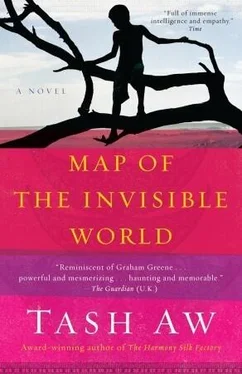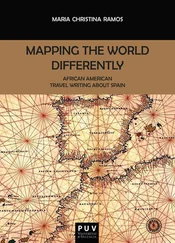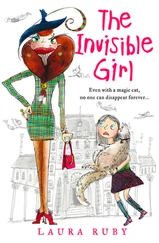Tash Aw - Map of the Invisible World
Здесь есть возможность читать онлайн «Tash Aw - Map of the Invisible World» — ознакомительный отрывок электронной книги совершенно бесплатно, а после прочтения отрывка купить полную версию. В некоторых случаях можно слушать аудио, скачать через торрент в формате fb2 и присутствует краткое содержание. Год выпуска: 2010, Издательство: Spiegel & Grau, Жанр: Современная проза, на английском языке. Описание произведения, (предисловие) а так же отзывы посетителей доступны на портале библиотеки ЛибКат.
- Название:Map of the Invisible World
- Автор:
- Издательство:Spiegel & Grau
- Жанр:
- Год:2010
- ISBN:нет данных
- Рейтинг книги:4 / 5. Голосов: 1
-
Избранное:Добавить в избранное
- Отзывы:
-
Ваша оценка:
- 80
- 1
- 2
- 3
- 4
- 5
Map of the Invisible World: краткое содержание, описание и аннотация
Предлагаем к чтению аннотацию, описание, краткое содержание или предисловие (зависит от того, что написал сам автор книги «Map of the Invisible World»). Если вы не нашли необходимую информацию о книге — напишите в комментариях, мы постараемся отыскать её.
comes an enthralling novel that evokes an exotic yet turbulent place and time—1960s Indonesia during President Sukarno’s drive to purge the country of its colonial past. A page-turning story,
follows the journeys of two brothers and an American woman who are indelibly marked by the past — and swept up in the tides of history.
Map of the Invisible World — читать онлайн ознакомительный отрывок
Ниже представлен текст книги, разбитый по страницам. Система сохранения места последней прочитанной страницы, позволяет с удобством читать онлайн бесплатно книгу «Map of the Invisible World», без необходимости каждый раз заново искать на чём Вы остановились. Поставьте закладку, и сможете в любой момент перейти на страницу, на которой закончили чтение.
Интервал:
Закладка:
The aide-de-camp blinked at Margaret for a moment or two. He shook his arm, flicking his wrist to look at his watch. “Follow me,” he said. “I’ll give you three minutes, that’s all.”
They left the room and walked quickly along a narrow corridor that seemed dark in spite of the windows that lined it. Outside there was a row of newly planted saplings that had not quite taken: Their leaves were beginning to turn crinkled and dry, falling on the bare earth. It was hot and musty in the corridor; the windows had not been opened in a while. Margaret hurried after the young man, struggling to keep up. They passed through an office manned by men and women dressed in pale khaki uniforms that gave the impression they were about to leave on an expedition somewhere remote; they did not look at Margaret as she went by but carried on bending over filing cabinets and typewriters and maps. Half-empty bottles of Fanta stood on desks along with overflowing ashtrays that permeated the air with the scent of kretek , which comforted Margaret. On one wall hung a crude oil painting of a volcano shrouded in cloud, and the national flag had been pinned loosely to a wooden board, where it fluttered at the edges as it caught the weak draft of the ceiling fan. They went through a sort of anteroom filled with mail bags and suitcases, and then finally emerged into another room whose windows opened once more onto the expanse of lawn, with the fountain in the distance. Three men in smart gray military uniform sat around a table, chuckling at something that had just been said; they looked up when Margaret entered. One of them had many medals pinned to his lapel. He said, “Who’s this?”
Margaret recognized the president immediately. He had not aged well; his face was jowly, despite the lips set tightly in permanent defiance of the world. His cheeks seemed even more pockmarked than before, and he looked much heavier. When he spoke, Margaret felt none of the dazzling power of youth he had once had; and the frown on his brow made him seem confused, not angry.
“It’s, uh, this is the American visitor I mentioned earlier,” said the aide-de-camp.
“I told you, I’m not in any mood to receive visitors,” the president replied, lifting a fine china cup slowly to his mouth. His lips reached for the rim of the cup as if uncertain of where it was, and he sipped hesitantly, noisily; he did not look at Margaret.
“I promise I will only be a few minutes, Abang Karno.” She spoke in Javanese, as clearly and calmly as she could, and when she heard her own voice she felt as if the voice belonged not to her but to another person, someone she had long forgotten. “It is an honor to meet you again.”
All three men at the table were studying her now. The president looked her squarely in the eye and his mouth began to draw into a faint smile. “Age is a terrible thing, for it destroys the memory. I have always had an excellent memory, but I cannot place you. I find this extraordinary.” His voice was still clear and strong, perhaps a touch deeper than before; but it did not excite Margaret as it once had.
“You have many things to think about, many people to remember. I wouldn’t want you to waste time on just one person like me.”
“Every person is worth remembering.”
“I have brought something for you,” said Margaret, pointing at the envelope the aide-de-camp was still holding. “It is something my, um, people would like to present to you as a gesture of goodwill and friendship.”
“And who are your people? You speak as if you come from the foothills of Merapi, but clearly you do not mean the central Javanese.” The men at the table laughed, and Margaret allowed herself a smile.
“Sadly not. I mean the good, honest people of America. Not so long ago you said that if America gave you a billion dollars and Russia offered you a loaf of bread, you would take the loaf of bread, because it would be given with love. Many of us understood why you said that. But we were hurt too because there are those of us who love this country very much.”
The president smiled broadly and Margaret felt a chill of excitement. “But this country is your enemy. I am your enemy, I am dangerous to your country. Isn’t that true?”
“I don’t know. That is something for politicians to decide, not ordinary people like me. But even if it is true, are we not meant to love our enemies?”
“This woman speaks like an Indonesian, not a Westerner,” the president said, turning to his companions. “Does she not?” They nodded and smiled. He said, “I think I do remember you now.” He took the envelope and shook it gently so that its contents fell onto the table. His fingers reached for the first slide with a certainty that suggested he already knew what it was. He held it level with his eyes for a second or two and lowered it without comment. “I see,” he said, sliding it neatly into the envelope. “A gift of something that is ours. Tell me, how does one make a gift of something that already belongs to the other person?”
“One can’t do that. It is impossible.”
His smile was charming yet severe. “So there is no gift.”
“The gift is not of the painting, of the object itself. It is the restoration of ownership, the reversing of an injustice. Some might say that this is not a gift, that it is simply the course of natural justice, but you and I know that in today’s world it takes courage and no small measure of generosity to provide the gift of fairness.”
The president looked at his colleagues and at the aide-de-camp. He nodded. “What are we to make of this?” They smiled nervously, unsure of the required response.
“I take it you have seen the Capture of Prince Diponegoro,” Margaret continued. “Please have a look at the other one. It is something chosen for you.”
Holding Margaret’s gaze, the president felt for the slide that remained on the table; even when he had brought it to eye level he continued looking at Margaret, not the slide. She felt a quickening of her pulse, a heavy tapping in her chest, and a tingle in her temple; she smiled. His eyes moved slowly to the dark square framed between thumb and forefinger, staring at it with no discernible change in expression. Without moving, he raised his eyes to look at Margaret for a split second before returning to the slide. He remained motionless, unblinking.
It is said that Sukarno had such great powers of concentration that he was able to read Dutch backward, or, rather, in reverse. It was a skill he was reputed to have honed as a teenager in Surabaya, where he would sneak into the projection room at the picture house and watch the films from behind the screen, hidden from the good seats occupied by Dutch people. Margaret had never known if this was a true story or one of the thousands of myths about him. In this country you had to surrender to myths, to the uncertainty of stories, to the failure of logic — that was something she had learned as a child, and she had rediscovered the aptitude quite easily on her return to Jakarta in adulthood. In this case she thought the story was probably true. She liked the idea of a young Sukarno sitting behind the picture screen, for it must have reminded him of the shadow plays so beloved of the Javanese, and given him the impression of being in control. He was not the poor-but-smart young boy the myth made him out to be, but someone already quite powerful. He could see the foreigners and understand what they were watching, but they could not see him. And although those eyes were older and smaller now in the gathering fleshiness of his face, Margaret could still see the intensity of the teenager’s gaze.
The president cleared his throat but did not move. Behind him, on a sideboard, stood a framed photograph of him with President Kennedy. They were riding in the backseat of a convertible with the top down, both smiling broadly. In the fuzzy background, across what might have been a parade ground, a row of cadets were standing at attention, their white gloves and belts dazzling against their dark uniforms.
Читать дальшеИнтервал:
Закладка:
Похожие книги на «Map of the Invisible World»
Представляем Вашему вниманию похожие книги на «Map of the Invisible World» списком для выбора. Мы отобрали схожую по названию и смыслу литературу в надежде предоставить читателям больше вариантов отыскать новые, интересные, ещё непрочитанные произведения.
Обсуждение, отзывы о книге «Map of the Invisible World» и просто собственные мнения читателей. Оставьте ваши комментарии, напишите, что Вы думаете о произведении, его смысле или главных героях. Укажите что конкретно понравилось, а что нет, и почему Вы так считаете.












